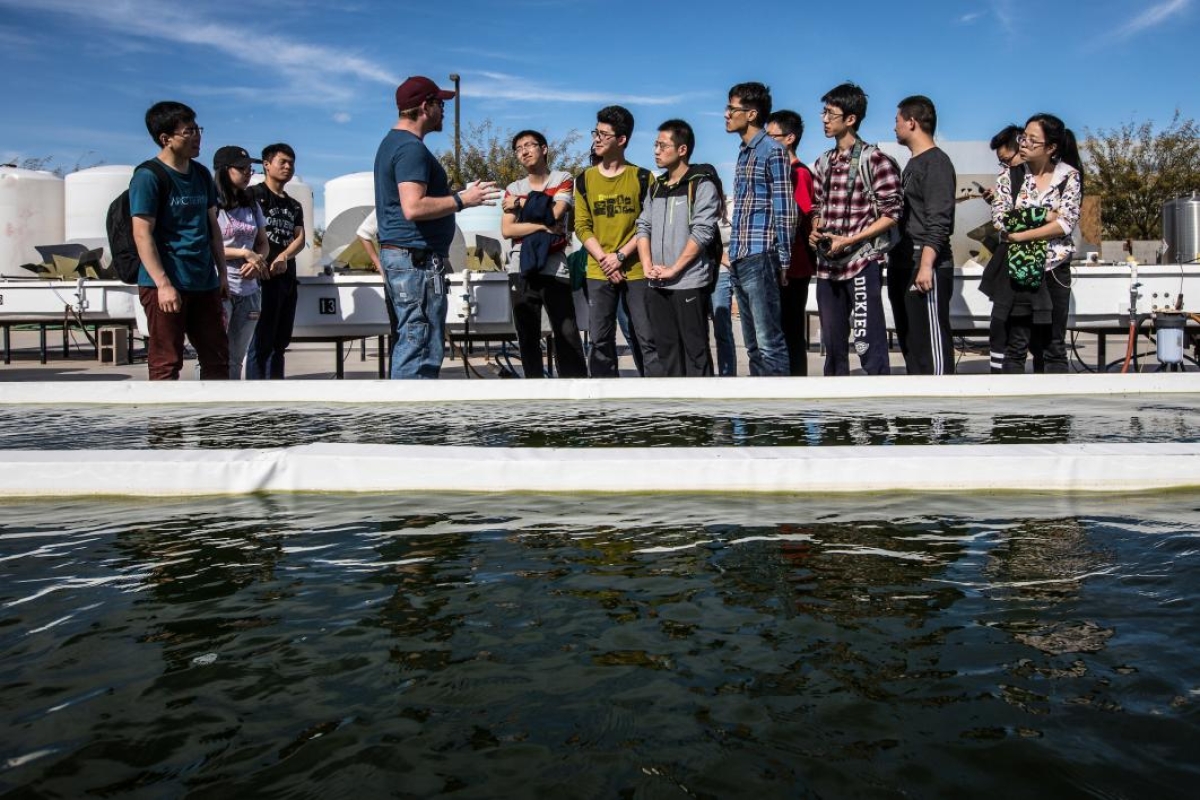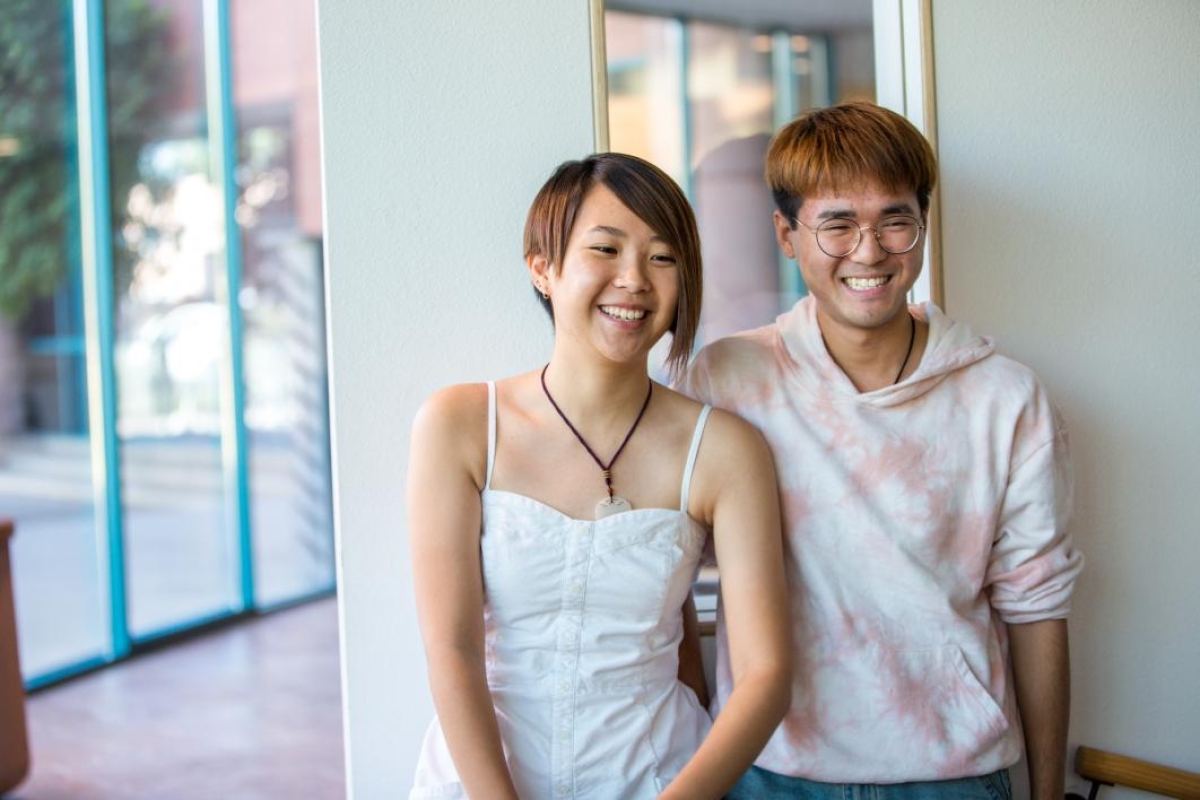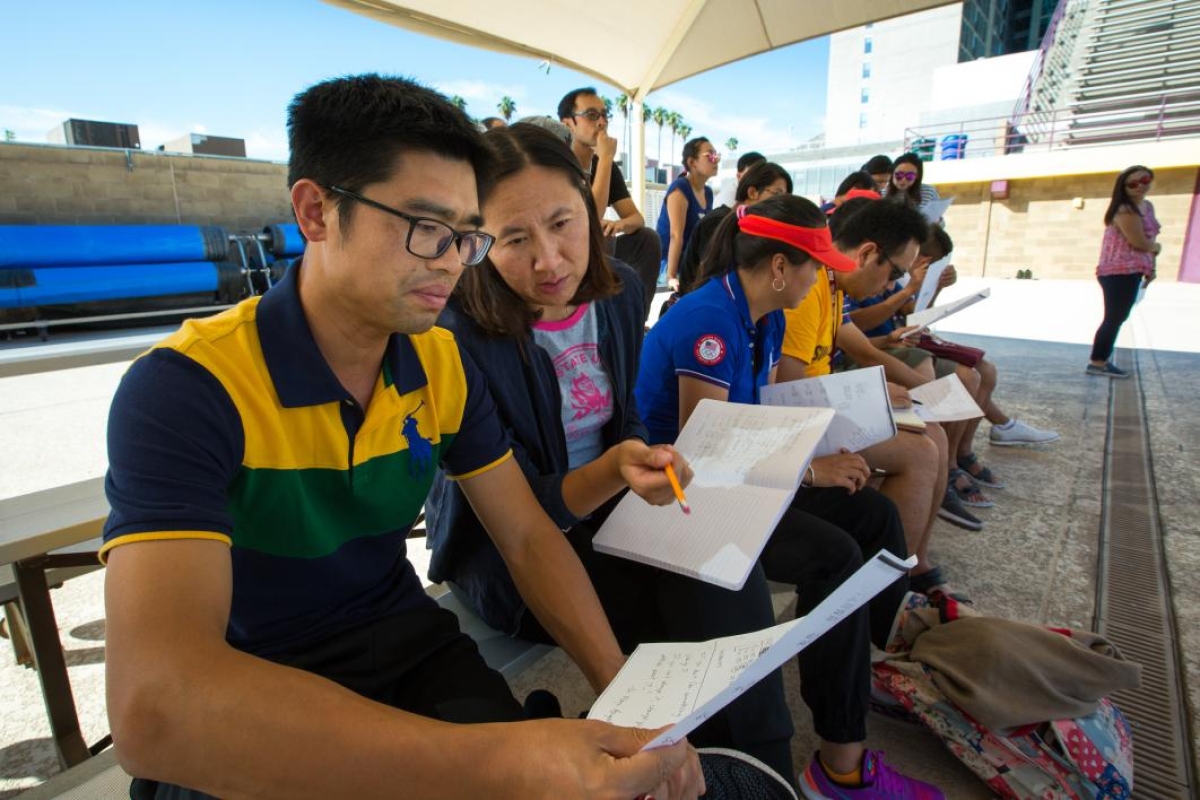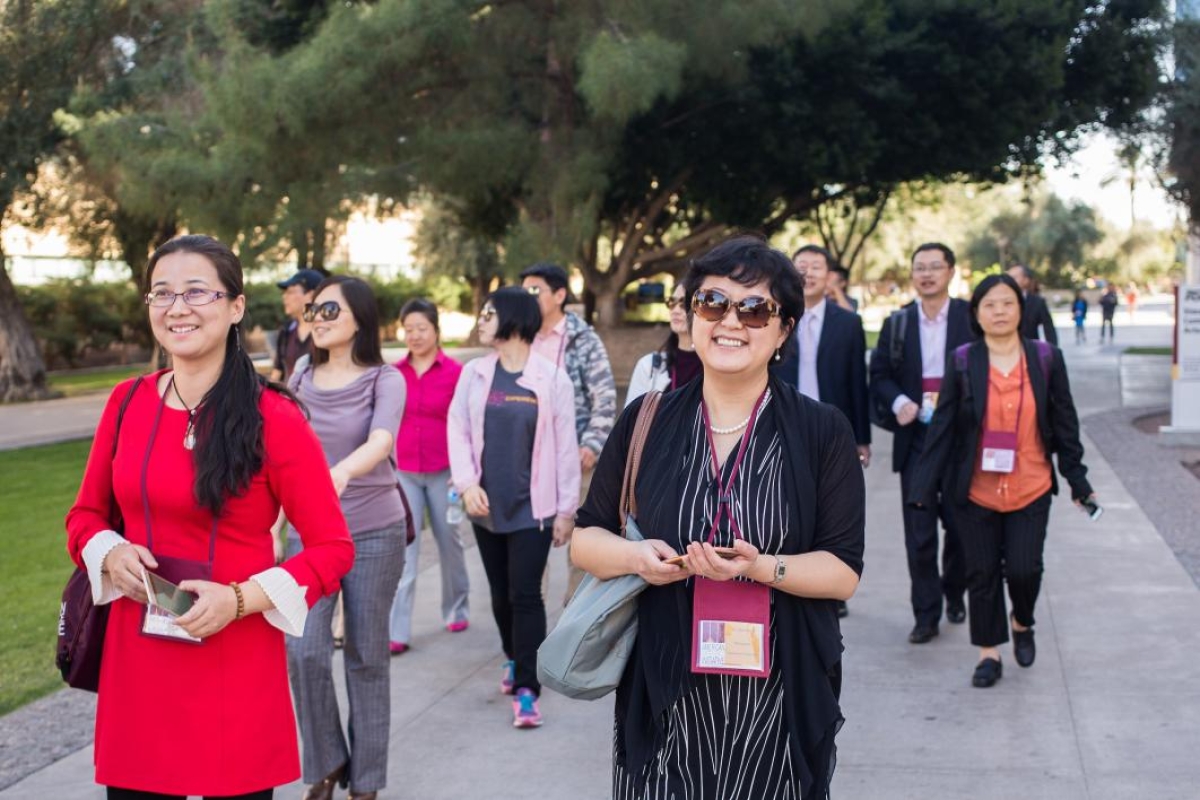Editor's note: This story is being highlighted in ASU Now's year in review. To read more top stories from 2017, click here.
At this week’s Global Education Summit in Beijing, the mother of an Arizona State University international student excitedly approached Michael M. Crow, eager to talk about her daughter’s studies and telling the ASU president that she was so thrilled to make the ASU connection on her home soil that she drove six hours on the off chance she’d get to meet him.
As ASU continues to pursue a deeper relationship with China and its universities, running into Sun Devil families across the Pacific might become commonplace.
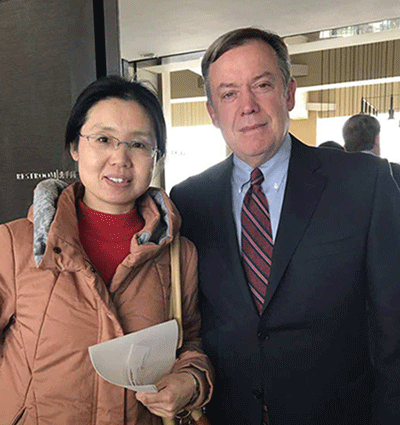
Julia (Fan Liyun), the mother of ASU computer information systems student Chenguang Li, meets President Michael M. Crow in Beijing on Monday.
Joining the Sun Devil family this semester were more than 250 young Chinese people who started classes at the first ASU location to offer undergraduate degrees in China. The students at the new Hainan University – Arizona State University Joint International Tourism College are learning in English and will graduate with ASU degrees in a venture that’s being funded by the Chinese government as a way to boost its travel industry.
“They picked ASU because we’re large and have the capacity to handle this kind of program, and also because we have a large tourism faculty that’s highly ranked in research,” said Kathleen Andereck, director of the School of Community Resources and Development at ASU, who is leading the program.
Over the past decade, the ASU-China ties have strengthened. More than 10,000 international graduate and undergraduate students attend ASU, with the largest group — about 3,000 undergraduates and 1,000 graduate students — from China. Last year, ASU hosted more than 250 visiting Chinese scholars.
ASU’s relationships with Chinese institutions range from simple student and faculty exchanges to high-level research deals, such as a partnership with Shandong University on “bio-inspired” cancer and vaccine research, water- and air-purification systems and advanced explorations of nanotechnology.
China is a huge economy, Crow said, and this week’s summit is a way to gather global technology companies, investors and education leaders.
“We can’t build universities quickly enough or scale them at a fast enough pace to be able to meet all of our educational needs,” said Crow, who noted that one of ASU’s design aspirations is global engagement.
“So this is an exciting meeting that allow us to figure out how to speed things up in terms of innovation.”
ASU’s initiatives in China span academic, cultural and entrepreneurial enterprises.
Globally minded academics
The university’s academic partnerships extend across disciplines and schools. For example, the W. P. Carey School of Business offers two master’s programs in Shanghai, with classes in Chinese. Last year, those programs graduated 82 students.
New next fall will be an international graduate program in which the W. P. Carey School of Business is partnering with both Sichuan University in China and Woosong University in South Korea. Students will study one year at each institution and graduate with three degrees: a master’s of finance from ASU, a master’s of science in corporate finance from Sichuan and an MBA from Woosong.
“At W. P. Carey, our mission talks about the fact that our students have the understanding that they are part of this global environment,” said Kay Faris, senior associate dean for academic programs at W. P. Carey. “This is very important to us, and I can’t think of a better way to do it than to have students study in a different country.”
Since 2013, more than 250 Chinese students have graduated with ASU master’s degrees through the International Accelerated Degree Programs. This partnership with 28 top Chinese universities permits students to earn their undergraduate and master’s degrees in less time. More than 30 degrees are offered, including landscape architecture in the Herberger Institute for Design and the Arts, geographic information systems in the College of Liberal Arts and Sciences and communication studies in the New College of Interdisciplinary Arts and Sciences.
The Chinese government has identified tourism as a growing enterprise, which led to the launch of the Hainan tourism college this year. That campus is teaching higher education the American way, which means fewer lectures and more interaction and writing, said Andereck. That’s an adjustment for the Chinese students, who are taking the one-credit ASU 101 this semester.
“Typically, students there don’t have as many opportunities to share what they’re thinking, and they noted that they appreciate being able to do that in this class,” said Andereck, who taught the first week of the course in September and will return in the spring to teach a one-credit freshman seminar.
“The students were so receptive to having us there, and they would say, ‘We will burst into tears when we finish this class.’ ”
Innovation and entrepreneurship
Entrepreneurship is another American-style concept that the Chinese are eager to study.
Next week, ASU will co-host the U.S.-China Youth Forum on Entrepreneurship, Innovation, and Economic Opportunities in Shenzhen — considered the Silicon Valley of China. The event will pair 50 American with 50 Chinese entrepreneurs, and they will learn about what’s required to enter both the Chinese and U.S. markets. Speakers will include Nate Blecharczyk, co-founder of Airbnb.
William Brashears, director of global initiatives at ASU, said the participants will get mentoring, attend panel discussions and network with each other.
“We feel the most important part of this will be to make connections with top Chinese entrepreneurs and build long-term relationships,” he said, “and see what the Chinese are doing with accelerators and incubators — the entire innovation movement in China.”
One young entrepreneur who was selected to attend the forum is Sam Hendren, an ASU junior who is majoring in global logistics management in the W. P. Carey School of Business.
Hendren already knows a lot about doing business with China. As a high school student, he founded Tech Gone Wild, an electronics accessories company.
“We sold cases for phones, tablets and other electronics, which we manufactured in China and worked with them to import into the U.S.,” said Hendren, who paused his company when he started at ASU.
“I was doing everything over the internet without being there, so that’s one reason I’m excited to see what it’s like firsthand. We have assumptions and hear things, but I’m really hoping to see the entrepreneurship culture in China.”
ASU is also offering entrepreneurship “boot camps” through the new Global Innovators Alliance. The first group, 20 students from Sichuan University, attended an intensive two-week session at ASU’s Tempe campus last summer, learning how to take a business idea from concept to reality, as well as how to navigate American business culture.
China, long a manufacturing powerhouse, is looking for ways to nurture home-grown innovation. One of the students at the camp, Shan He, an English language and literature major at Sichuan, wants to be a part of that.
“I know Americans have done this for a longer time and have already built a culture of doing this,” she said. “I would like to do consulting to promote this culture and creativity in China to help startups.”
A window into culture
Cultural exchange is another vital aspect of ASU’s partnerships, and the university was an innovator in this area. The Sichuan University-Arizona State University Center for American Culture was the first of its kind when it was created in 2011. Its success led to the American Centers for Cultural Exchange, or ACCEX, a bilateral network of 11 American cultural centers on university campuses in China, funded by the U.S. Department of State.
Each center runs outreach activities, lectures and performances to create a more accurate understanding of American culture and everyday life, according to Brashears, who is director of the Sichuan-ASU center.
For example, the Sichuan-ASU center created a program on race in America that it took to four universities in China. This past summer, scholars from ASU visited to discuss Latino culture, and the center ran a hugely popular video contest for the Chinese students.
“This was about showing the diversity of American culture that had not been touched on before in China,” he said.
A longer established cultural partnership is the Confucius Institute at ASU, with Sichuan University and the Ministry of Education in China, which promotes language and culture programs. The institute, which just marked its 10th anniversary, offers Chinese language courses, summer camps for kids, faculty exchanges, study abroad for ASU students and artistic performances.
And the Confucius Institute reaches into the metro Phoenix community, supporting 14 “Confucius classrooms” at schools around the Valley that teach Mandarin to K-12 students, with several using an “immersion” model in which entire subjects are taught in Mandarin.
College sports is another uniquely American concept that is intriguing to the Chinese, who don’t have a system of encouraging students to pursue athletics at an elite level while they earn a degree. Coaches from China have visited ASU for the past two years to see how it’s done. The visits are part of an initiative by the Pac-12 Conference to strengthen ties with China.
The coaches spent three months on the Tempe campus, observing how a Division I athletics program works. They attended practices of the men’s and women’s basketball, swimming and track and field teams, learning about sports medicine, nutrition, sports psychology and academic support.
Under its “One Belt, One Road” global trade initiative, China is reaching out to the world, and ASU is ready with expertise in higher education, research and entrepreneurship, Brashears said.
“All of their universities are beefing up their language studies, intercultural communication and global communication,” he said.
“It’s an impressive movement."
Video by Jamie Ell/ASU Now
Top photo: Shan He, an English language and literature student at Sichuan University, was one of 20 Chinese students to attend an entrepreneurial "boot camp" at ASU this past summer in a partnership between the two universities. Photo by Charlie Leight/ASU Now
More Local, national and global affairs

How ASU research is helping first responders
Arizona State University’s faculty members are studying how to improve the jobs, health and well-being of first responders, and also applying their research through direct training to help these…
ASU honors Sun Devils, local organizations with Social Work Month Awards
Arizona State University’s School of Social Work recently honored a total of 29 students, faculty, staff, alumni and local community organizations with its annual Social Work Month Awards.The…

ASU's USAID projects provided economic benefits to US
For more than a decade, Arizona State University has helped people around the world — and advanced interests in the United States at the same time — through its collaborative projects with the U.S.…



